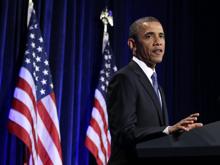
Indeed, Obama’s March visit to Israel, the Palestinian Authority and Jordan looked like nothing so much as a “courtesy call” to introduce America’s new man on the Middle East — John Kerry, who accompanied him on the visit.
A short review of Obama’s dealings with the Middle East is in order. It got off to a promising start.
After Obama took office in early 2009, the new American administration found it necessary to beef up US foreign policy on the Middle East and take it in a new direction after its collapse during the Bush administration. On June 4, 2009, Obama spoke at Cairo University and addressed the entire Muslim world, giving his views on the problems of the Middle East. I recall very well that the Arab-Israeli issue was a key part of his Cairo address.
At the time, his speech seemed so pro-Arab that the “unbreakable” relationship between the United States and Israel was barely evident. But it was in vain. We soon saw how easily the current US president changes his views.
Obama’s verbal balancing act was obvious in May 2010 when he became the first US president to say that the future Palestinian state should be established within the 1967 borders.
Three days later, however, after a barrage of criticism from the Israeli government and the “Jewish Street” in the United States, the US leader expressed what was virtually the opposite position in a speech in Washington to an audience of 10,000 at the annual meeting of the American-Israeli Public Affairs Committee (AIPAC).
It is no wonder that Obama’s inconsistency has prompted many people to look at him from the standpoint of psychology.
In early 2009, that “patriarch” of American foreign policy Henry Kissinger used a very accurate image when he compared Obama with a chess player who is playing simultaneous chess and has opened his game with an unusual opening.
The opinion of the journalist Byron York, who looked into Obama’s student life in Chicago, is also noteworthy with regard to that. He pointed out that Obama was magnificent at organizing people, but not very good at deciding what they should be doing, i.e., in other words, he did not see the big picture.
Obama is definitely suffering from a flare-up of his old “student” disease. At least he is as far as the Middle East peace process is concerned.
But is that the only place where it is happening? If Obama became president of the most powerful country in the world today with this kind of shortcoming, he obviously must possess phenomenal political instincts. In fact, he demonstrated that during the AIPAC meeting, and he is apparently still doing so.
After all, it is obviously almost impossible to find an acceptable solution to the Israeli-Palestinian issue as things currently stand because of the intransigence of the parties to the conflict.
Then there was also the Arab Spring. It was driven by America’s satellites in the Arabian Peninsula but has stalled in Syria and is not going to spread further into Central Asia.
That is a serious matter for Washington. A delay in exporting revolutions in Central Asia could result in the United States’ chief competitor for world domination — China — gaining a foothold here.
I have previously said in New Eastern Outlook that beyond Beijing’s impressive economic success (according to some forecasts China could become the world’s leader in industrial production by 2015), it is on the move and, is developing its own “Eurasian” ideology.
According to the new ideological winds blowing from China, its history includes not just the history of the Han ethnic group, but also that of peoples conquered by China for at least a short period of time and of peoples that had conquered China. Therefore, modern Chinese historians include the conquests of other states (e.g., Mongolia) among China’s territorial acquisitions.
This reading of the “historical myth” allows China to have far-reaching plans for almost all of the Eurasian oecumene, especially Central Asia.
The White House, of course, understands very well that China’s economic successes backed up by a solid Eurasian ideology could produce a change in geopolitical leadership. And Washington is apparently developing a new deterrent system around China to prevent that from happening. It is somewhat reminiscent of the policy of deterring the Soviet Union developed by George Kennan in the late 1940s, as well as the famous Cohen-Kissinger anti-Soviet “anaconda.”
Apparently, the White House cannot deal with the Israeli-Palestinian problem right now, especially since a rather strong reason for turning its attention to the Asia-Pacific Region has cropped up — North Korean nuclear “horror stories.”
And when you come right down to it, Obama, with his phenomenal political instincts, has almost nothing to lose by letting Kerry take center stage on the Middle East.
Kerry can, of course, take the blame if his attempts to shake things out on the Arab-Israeli track fail.
If a miracle happens and the ambitious current Secretary of State succeeds in bringing the Israelis and Palestinians to the negotiating table and getting them to sign a more or less acceptable agreement, a master of the public relations like Obama will be able to take credit for it.
After all, history has shown that in the end those who get the victor’s laurels in this area of American foreign policy are not the secretaries of state, whether they are Cyrus Vance or Warren Christopher, who laid the groundwork for Camp David ‘79 and Oslo ‘93, but their bosses — Jimmy Carter and Bill Clinton.
Vitaly Nikolayevich Bilan holds a Candidate of Science (History) degree and is an expert on the Middle East. This article was written expressly for New Eastern Outlook.
